A country strongly rooted in tradition, Japan places great importance on social customs and etiquette. More than anywhere else, social rules govern daily life in Japan, from meals and business meetings to exploring temples and onsen throughout the country. It can be quite intimidating to first-time visitors who want to avoid embarrassment or causing offence.
But don’t fret; as a guest in the country, you’re not expected to know the ins and outs of Japanese culture! In truth, foreign visitors can often get away with the occasional faux pas. “Japanese people are very forgiving when they know you’re a tourist and you’re trying to respect their culture,” said Jaimee Bruce-Lynch, a writer and teacher based in Kawasaki, Japan for the last seven years.
Besides, some famous etiquette rules in Japan aren’t actually that strictly implemented. Keep reading for the rules you won’t have to worry about on your next trip to the Land of the Rising Sun — and a few of the rules you should actually be following!
Also read: Tokyo or Osaka: Which City in Japan Should You Visit First?
1. Eating while walking is a no-no
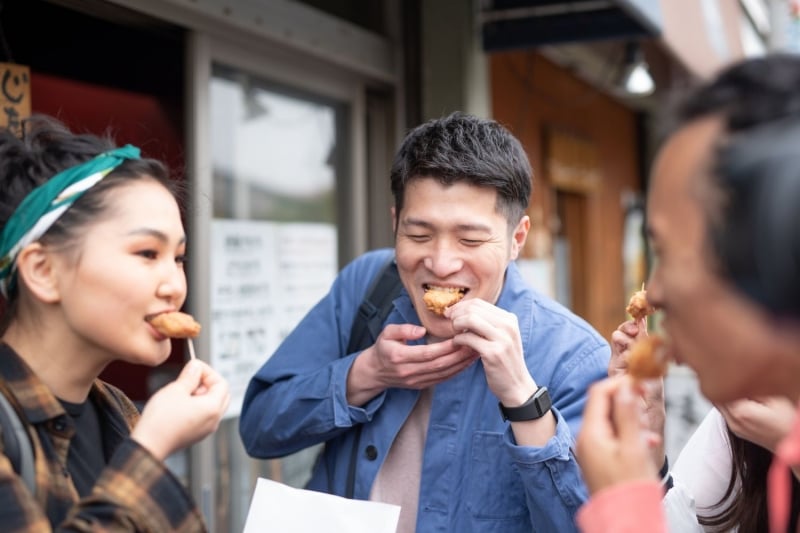
Image credit: monzenmachi via Canva Pro
Eating while walking is common in many Asian countries known for street food, but the Japanese tend to avoid this practice and find it uncouth. Instead, diners are encouraged to practise good table manners when in Japan and find a spot to sit and savour their food. Food stalls will also typically have a sitting or standing area where patrons can eat.
That said, it’s no longer that unusual to see people eating and drinking on the go, especially in busy tourist areas or major cities. Eating and drinking on the streets won’t be something that will get you in the good graces of the locals, but it won’t be very offensive either. Even residents will occasionally grab a bite when they’re in a rush to go to work.
Just make sure to throw your waste in the proper trash bin, because the Japanese do take littering very seriously. If there are no trash bins around (which is common), put your rubbish inside your bag or pocket, and then dispose of it at home instead of leaving it on the street.
2. One must sit on tatami in the exact proper way
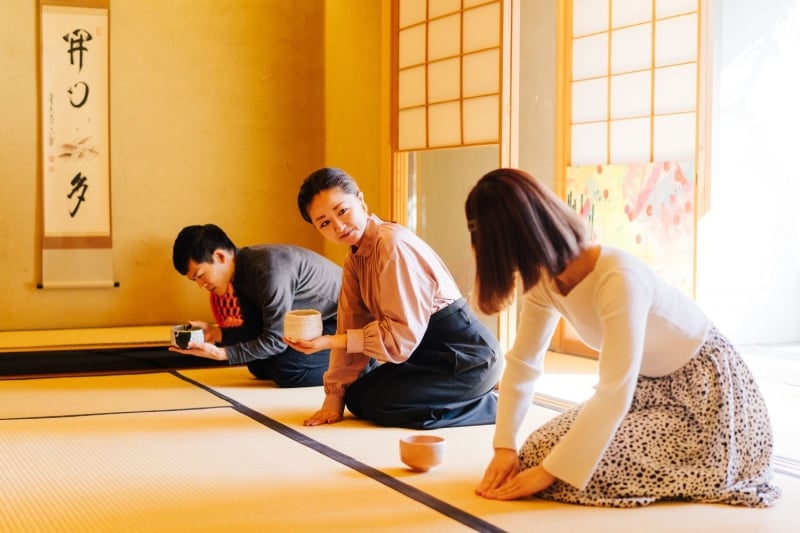
Image credit: Studio Japan via Canva Pro
There’s a word for the way people sit on tatami floors: seiza, which translates to “proper sitting.” It’s basically being on your knees, with your buttocks resting on your feet. While this is expected in formal occasions like funerals, seiza can be very uncomfortable after the first few minutes, especially if you’re unused to it.
The good news: It’s unlikely you’re required to spend a whole meal kneeling, even if you’re on tatami flooring. It’s hardly one of the stricter rules in Japan, with very few people minding travellers who prefer a more comfortable way of sitting. Men typically sit cross-legged, while women sit with their legs folded to the side.
And if it makes you feel better, even some Japanese people won’t be in seiza for an entire meal either! The elderly are exempt from the practice, even in formal settings.
However, Jaimee advised removing shoes and even indoor slippers before stepping on tatami mats. Tatami isn’t the easiest material to maintain, she explained, so etiquette in Japan requires the removal of any footwear. Guests can usually keep on socks — it goes without saying that your socks should be clean, of course!
3. Bowing is the right way to greet others
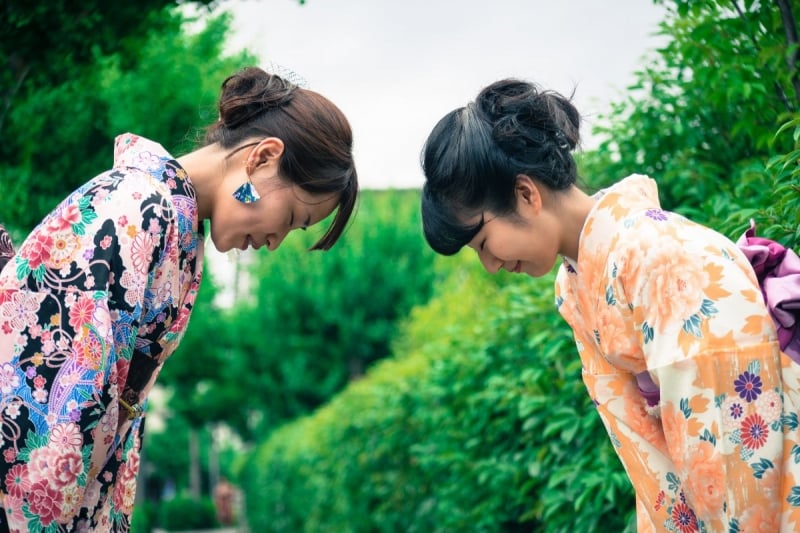
Image credit: Ababsolutum via Canva Pro
Like many things in this deeply traditional East Asian country, there are intricacies to bowing in Japan. The depth and length of the bow vary, depending on how apologetic you are or on how important the person you’re greeting is.
As a foreign tourist, don’t sweat the rules of bowing in Japan! Most people you meet in the country won’t expect guests to be well-versed in the practice, anyway. Instead, a respectful bow of the head or upper body will suffice. Even a handshake will do! Although shaking hands isn’t very common among the Japanese, it’s something that they’ve gotten used to doing with tourists through the years.
4. Tattoos are taboo and must be covered at all times
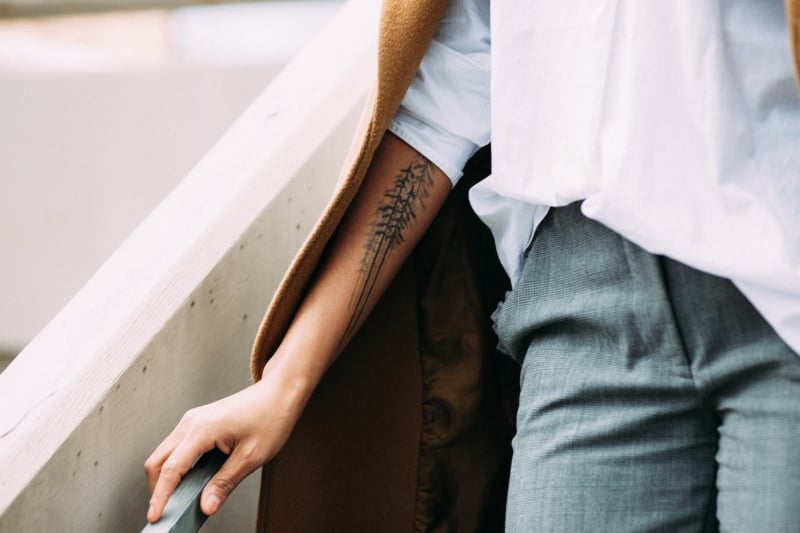
Image credit: Cortney White
For a long time, tattoos were largely considered taboo in Japan. Older people used to associate tattoos with the Yakuza, a Japanese crime syndicate. From the late 19th century to the early 20th century, tattoos were even prohibited by law. Thankfully, this is no longer the case!
A shift in recent years means more younger Japanese people have been sporting tattoos openly and proudly in the country. Tourists with body art will be happy to learn that there’s no need to cover up tattoos for etiquette when out and about in Japan.
However, there’s one exception: onsens. Plenty of onsen and ryokan still prohibit locals and tourists with tattoos from bathing in their public baths. So, contact an onsen before visiting and ensure you’ll actually be allowed inside. Jaimee also recommended reserving a private onsen — a good idea for travellers who prefer a little privacy while bathing, too!
Also read: A Guide to Staying at A Japanese Ryokan: The Dos and Don’ts
5. Wait for others to pour you a drink on a night out
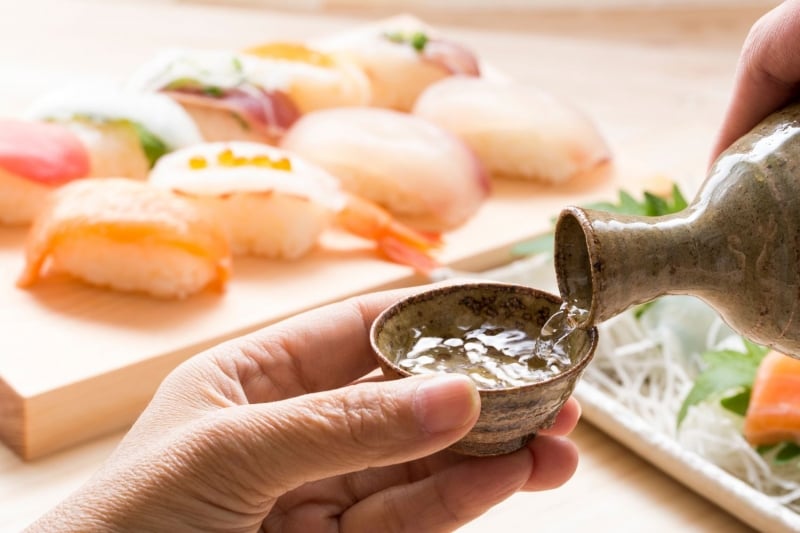
Image credit: kazoka30 via Canva Pro
Work get-togethers may be a bit more formal, so etiquette rules in Japan may require you to wait for a colleague to pour you a drink. (If they do, pour them their drinks, too!). Traditional companies will even position guests around the table according to hierarchy.
But when it’s just a party among pals, Jaimee assured travellers that there’s no need for such formal table manners in Japan. Like anywhere else in the world, friendly gatherings tend to be more relaxed. She said, “As the party goes on, people usually just enjoy themselves.”
Also read: Tokyo Nightlife Guide: 12 Best Bars & Clubs to Enjoy the Local Scene
In general, the Japanese tend to take tourist blunders in stride. As long as you try to respect their culture, the people will appreciate your efforts with local etiquette rules in Japan. Even if you do fall short sometimes!
That said, the best way to avoid mistakes and offences is to take your cues from the people around you. If locals are eating, then it’s probably fine for you to take a few bites. On the other hand, a completely silent train isn’t the best place to take a phone call. If you’re polite, respectful, and aware of local customs, expect to cruise through your Japan trip with few problems. Enjoy!
Featured image credit: Graham Powell-Wood | Unsplash




